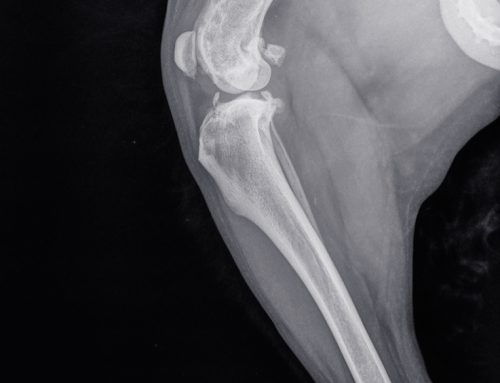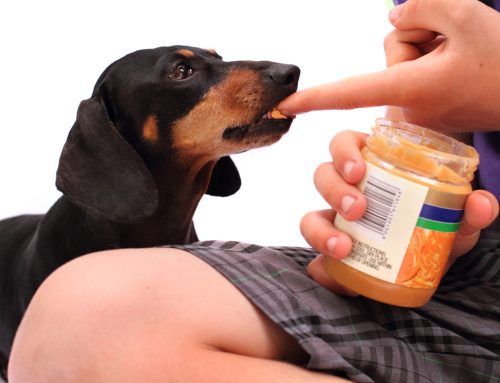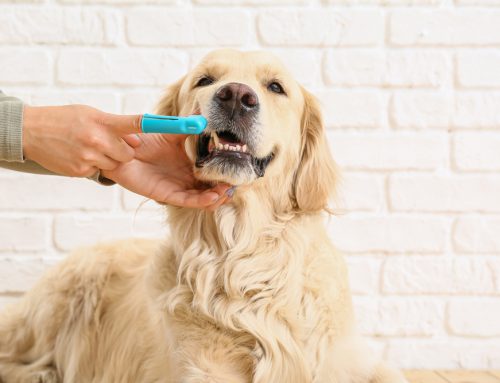The holidays should be all about spreading good cheer, eating delicious food, and making memories with friends and family—not about an emergency veterinary visit for your furry pal. However, cats and dogs don’t pay attention to safety lessons when tempted by shiny objects, tasty food, and other holiday dangers. As a pet parent, you must guide your four-legged friend along the straight and narrow path, and keep them out of trouble this holiday season. As you avoid mischief and pitfalls along the way, keep a sharp eye out for the main dangers—food toxicity, pancreatitis, and foreign object ingestion.
Food toxicities and your pet
Food that tastes so delicious can’t be bad for your pet, right? Think again. Many of our favorite holiday side dishes and desserts contain ingredients that can harm pets by causing mild toxicity like vomiting and diarrhea, or serious problems, such as cardiac issues and liver disease. Some foods can kill your pet, if they eat a large enough amount. When cooking up a storm in your kitchen, keep your pet safely confined away from the danger zone. Too many furry cooks in the kitchen can spell disaster if you trip over your pet and drop a dish, or they sneak a taste on the sly. When cooking with the following ingredients, watch your pet closely to avoid common toxicities:
- Chocolate — Chocolate is a major food toxicity that pets can’t seem to resist. The darker the chocolate, the more deadly, so keep your baking chocolate well away from your pet’s drooling jaws.
- Xylitol — This sweet substance, which may be good for your waistline as a sugar substitute, can quickly lead to death in your dog. Known for causing a severe, sometimes fatal, drop in blood sugar, xylitol can also cause liver failure if your pet eats a dessert, candy, or gum sweetened with the substance.
- Macadamia nuts — Nuts are great for heart health, but macadamia nuts pack a negative punch to your dog’s health. These nuts can cause depression, weakness, tremors, and vomiting.
- Raisins — When filling up your fruitcake with raisins—and rum—keep your pet well away, as raisins and grapes can cause fatal kidney failure.
- Garlic, leeks, onions, and chives — While useful for spicing up your dishes, these plants from the allium family can destroy your pet’s red blood cells, leading to anemia. Whether raw, powdered, or cooked into a dish, keep these ingredients away from your pet.
- Yeast — As your yeast dough rises on your counter, ensure your pet doesn’t eat any. Unbaked yeast dough can cause alcohol toxicity and a fatal condition known as gastric dilatation volvulus as the dough expands in your pet’s stomach.
With so much toxicity potential, play it safe by sticking to commercial pet treats this holiday season. Or, spoil your pet with baby carrots, broccoli, green beans, or a small chunk of unseasoned, lean meat.
Pancreatitis and your pet
All the best foods in life seem harmful to pets. What a tough break for your furry pal! But, avoid sharing many “people foods” to ensure your pet doesn’t needlessly suffer from a food toxicity, or pancreatitis, another common condition. Pancreas inflammation can be triggered by fatty or rich foods, such as a Christmas ham, stuffing, gravy, or any number of side dishes. In some cases, pancreatitis has no known cause, but the condition can still be incredibly painful and debilitating for your pet. If you notice vomiting, diarrhea, or abdominal pain in your furry pal, schedule an appointment with your Scripps Ranch veterinarian.
Foreign objects and your pet
While edible foods can create serious issues in your pet, so can inedible objects, such as a Christmas ornament, toy, or ribbon. An object that should not be ingested is called a foreign body, and often requires removal from the stomach or intestinal tract. For example, cats are well-known for their penchant for swallowing ribbon during the holidays, which can cause a linear foreign body. As the intestinal tract attempts to move the ribbon through, it gets stuck, and bunches the intestines accordion-like. Many Christmas decorations are known for causing foreign body obstructions, and if your pet hasn’t yet learned to keep their paws off, blocking off your tree, gifts, and other decor is best.
Holiday plants and your pet

In addition to your Christmas tree and all its accessories, other holiday plants can spell danger for your pet. While poinsettia plants are not nearly as toxic as the legend goes, they can still cause excessive drooling and vomiting, but the true concerns are mistletoe, holly, and lilies, which should all be kept well out of your pet’s reach. After all, you don’t need mistletoe as an excuse to plant a Christmas smooch on your furry pal.
Is your four-legged friend a magnet for trouble? If so, keep Scripps Ranch Veterinary Hospital’s number close by. The holidays are full of opportunities for mischievous pets, and our team wants you and your four-legged pal to enjoy a safe, happy, and healthy holiday season.





Leave A Comment